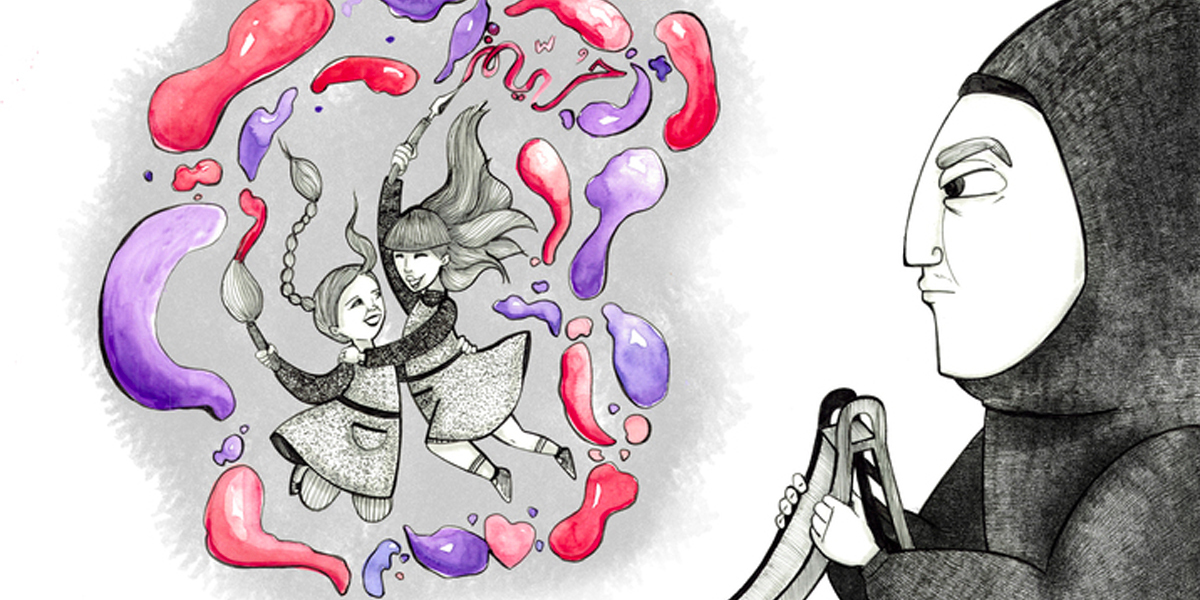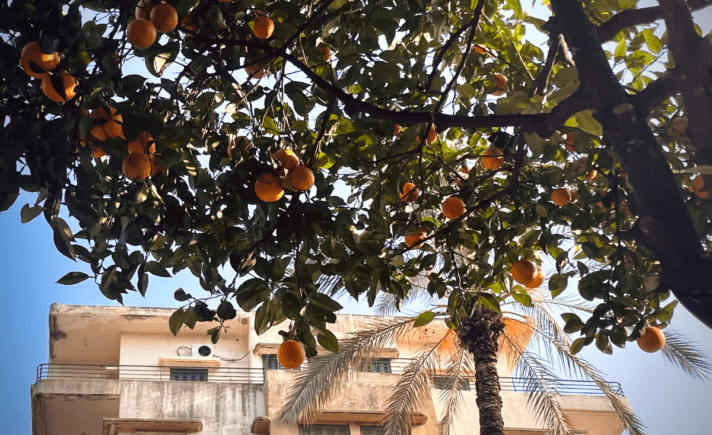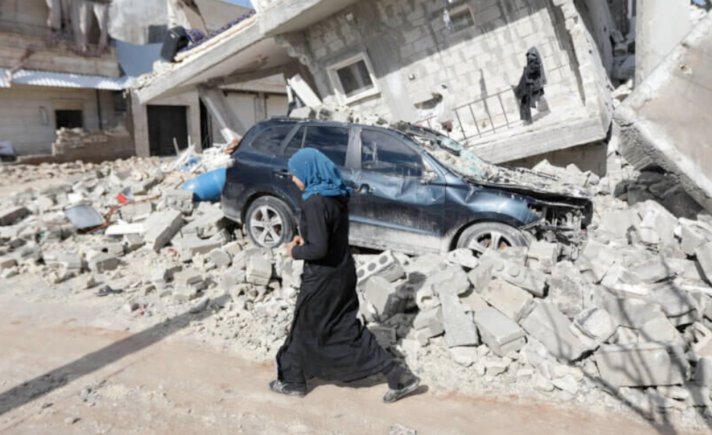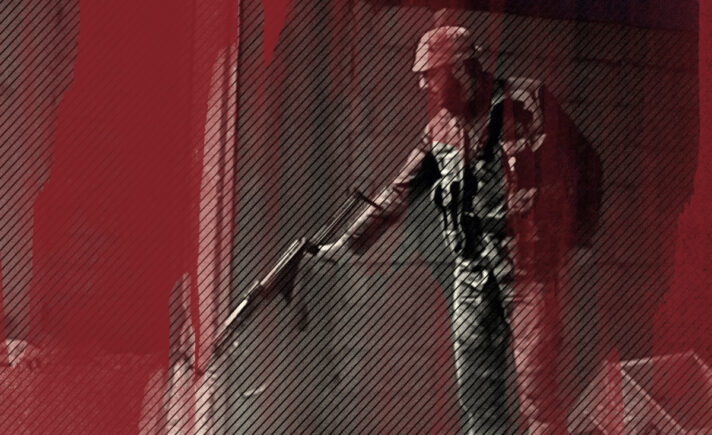Alif, baa, taa, thaa… ا, ب, ت, ث… I sat there looking at my father as he went through the Arabic alphabet over and over again, in preparation for our move to Damascus. I was eight years old, and oblivious to the Arab world, apart from the stories Baba told me. “Say ‘خ’!” he would say. “H,” I would muster. The guttural sounds of the East were alien to me. Until that point, I had been privately educated on the London Road at St Philips Primary Convent School. I would no longer be needing my straw bowler, Mary Janes, and clipped pronunciation. I went from one set of covered, stern, pallid women to another; the only difference being their religions. Omar ibn al-Khattab was an obscurely-placed private school in the district of Mezza, cradled in the basement of a residential block. My father dropped me off and handed me over to a woman dressed in a long stripy manteau and a white scarf knotted tightly under her chin. “Is she a nun, Baba?” I asked. “Sort of,” he whispered. The classrooms were cloistered, dark, and very much overcrowded. As we walked past, I could hear the children parroting back the lessons in unison. My Arabic was pidgin at best; my accent laughable; my task to sit an entrance exam. She began to dictate out a passage for me to write: ذ ه ب ت ر ب ا ب ا ل ا ا ل م د ر س. My cheeks burned with the frustration of ignorance as I tried desperately to place the letters onto the page in a decipherable manner. Out came an array of disjointed letters that I thought I could hear. The teacher looked on my scribbles with undisguised contempt. “She’ll have to go into Year 3, she can’t even join the letters,” I overheard her say. Which is how I found myself sitting next to Dima.
“What’s your name?” she asked quietly. “Farrah.” We were crammed in, at least six to a bench, lined up to face the blackboard. There was no space for maneuver and it was overwhelmingly claustrophobic. Dima fidgeted continuously; a trait she has carried through to her present day clowning! It was positively Victorian, and far from what I was used to back in England. Changing school is hard: changing school, continent, and language is traumatic. Yet it’s beautiful how children adapt, and communicate by the simplest methods. Dima was my comfort in this alien environment. Her face would erupt in the most wonderful of smiles that would set her eyes dancing. I never forgot it, and when I looked for her on Facebook many years later, sure enough it gave her away. We communicated through song; I taught her the Christian hymns I had learnt back at the convent, which we would sing to the class to the delight of our English teacher Majida (the only one I remember with fondness). Ironically, Dima had also been transferred over from a convent school in the Christian quarters of Damascus. We shared, then, in this quasi-Christian–Muslim upbringing. Unlike my disjointed letters, Dima and I quickly became inseparable, and, faithful to the nature of children, I became fluent, literate, and deliciously guttural all too soon. She taught me the playground rhymes, the games; she taught me to assimilate. My old London classroom faded away into the vaults of my memory. My nuns were now these equally-rigid women who barely smiled, and according to my childhood recollection had some seriously scary eyebrows.

My arrival into Damascene society coincided with the rise of the Qubaysi women’s movement, an apolitical moderate Islamic group with Sufi undertones. They practiced in the form of private social gatherings held in houses; a bit like an Avon House Party, except they were flogging morals rather than beauty products. Women would gather and talk, cook and eat, and the central figure would be the Shaykha who would give the lessons. She was an idol of sorts to her disciples. They were overbearing, judgmental, stifling, blinkered, and somewhat entitled. Very much part of bourgeois female society, they flitted between the houses giving halaqas (religious study sessions). The pecking order was graded according to the color of the tightly-knotted scarves: navy, royal blue, and white. Syria was and is officially secular, and ever since the Muslim Brotherhood uprising in Hama in the 1980s, religious lessons of this kind were very much outlawed. Hence they worked clandestinely, and are often viewed to this day with a certain skepticism, seen as possibly infiltrated by the Baath Party or even related to sitting members of parliament. Either way, their movement permeated female life, dictating acceptable ethics and behavior, and even influencing personal lives. They included the women who taught me and Dima. It wasn’t long before I incurred their displeasure: climbing up a slide one day, I unwittingly flashed my knickers while sitting down to descend. The rigid one at the bottom gasped in horror. I felt myself sliding down into the path of wrath. Who would have thought that “My Little Pony” knickers could be so offensive? I stood there, doe-eyed and startled from beneath my heavy fringe, unaware of the sin I had committed. She lifted my skirt to bare my naked thighs. “Where are your knickerbockers?!” Again, I was clueless to what she meant! The wooden ruler across my palms soon made sure I wouldn’t forget. Now I knew why the tomboyish Dima preferred to wear trousers.
Dima was a bubble of hyperactivity adored by her brothers, who naturally always drifted over to the boys, equally apostatized in her excitement as she handed out birthday invites to a number of them. The teacher saw her and snatched them away. “Are you a boy, to be inviting the boys!?” she screeched. “These will go straight to the headmistress!” We were two vehemently nonconformist girls who found ourselves amongst a battalion of wretchedly miserable hags. We had to memorize everything; to stand in line at the beginning of each day in true socialist style and sing the Baath songs; berets cocked to the sides of our heads; neckerchiefs tightly fastened like nooses, lest we forget; chanting at the top of our lungs how we would devote our souls and blood to Hafez al-Assad. A meticulous totalitarian wheel of indoctrination oiled with religious surveillance. There was little play or exercise; the slide and swings that lay seldom-touched at the back of the courtyard were only for “special occasions,” callously teasing us; a child’s introduction to dictatorship. Explaining to Joan Juliet Buck why she had just played a cruel prank on a group of children, pretending their youth center was going to be shut down, Asma al-Assad said, “The idea was to get them out of their comfort zone, throw them off. I do it all the time.” I was pushed further and further into the realms of my imagination, where I could play for hours undisturbed.
I remember attending one of the halaqas as a young teenager. A fat, pompous, and arrogant woman was dressed entirely in navy, apart from the very dark tan stockings that were in stark contrast to her podgy white face. She was perched on a chair I felt sure would give way any minute from her substantial behind. We all sat on the floor as she beautifully relayed stories of the Prophet, PBUH. There was nothing untoward in the content; it was the intent that struck me. The way they scolded and snapped with self-appointed authority. How they basked in the reverence that some of the girls showed them. The way they exercised a hold over some of them, to the extent that some girls would follow them around like groupies from house to house, running errands, working as their maids, abstaining from marriage. Their pursuit of a social monopoly on female behavior and, ultimately, their alliance with the Baath Party overshadowed the beauty of what they taught, regrettably. Fundamentally, they were nothing but apologists who wanted to emerge from the shadows and into the mainstream mosques. The Assad regime has no doubts about their loyalty, which is why state TV has broadcast several of their public meetings in recent years.
On a whim at the age of 18—to conform, I suppose—I decided to wear the hijab. They descended upon our house, where a mawlid ceremony was held for me; a sort of initiation into womanhood. The Shaykha tapping away on the tambourine was the daughter of a prominent serving Baathist politician: the very same who unashamedly cried like a baby on national TV in parliament when the death of Hafez al-Assad was announced. I could never marry the two together; a religious conscience with Baathist affiliation. My hijab lasted a year. I felt it was an added restraint to the many with which I already had to contend. Putting it on was a very public affair; taking it off was a very public execution. I had a speech of justification ready for every time I was interrogated.
*
Back at Omar ibn al-Khattab, on graduating Year 3 I sat another test, and this time I passed. They tore me away from Dima, as she went into Year 4 and I Year 5. As the years passed, we saw each other intermittently. At my wedding, aged 20, she danced her way into my past, into the void that comes after separation. For years I lived a somewhat dormant existence. Then a westerly wind blew in my direction and I capsized, eventually finding myself amidst the waves upon dry land. I divorced, and decided to try and retrace my steps, to find all those who had made my life that much richer. And there she was, my very own Dima, on the BBC’s list of the 100 most inspiring women of 2018! Well of course she would be. I messaged her and she phoned immediately. Soon I had booked my flight over to Beirut to see her.
Nestled in on the balcony in Furn al-Shubbak amidst the chiming of the church bells, we spoke for hours about how our lives had forked. How we had both traversed similar hurdles, both fought the same battles, and ultimately were both too vocal, until eventually we both found means to channel this. Syrian voices scattered across the globe, unsilenced, passionate, and honest. I was back there with my childhood friend, and she smiled and captivated me once again, transporting me back to our dingy classroom. For me, faith is sincerity, kindness, and humility. The Qubaysi women sullied my understanding of spirituality, and to an extent they drove me away from religion. I had to rediscover it myself on the road of life. These same qualities I found in places all around the world, in people from all walks of life. I found it without having to pander to any intermediaries. “Don’t let them make you hard.” “They?” “The nuns,” goes an exchange in Graham Greene’s Our Man in Havana. Dima and I never did, and they failed to dull Dima’s hues or snatch away my pen.





